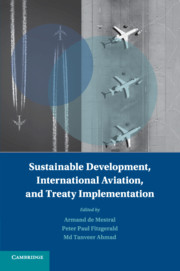Book contents
- Sustainable Development, International Aviation, and Treaty Implementation
- Treaty Implementation for Sustainable Development
- Sustainable Development, International Aviation, and Treaty Implementation
- Copyright page
- Contents
- Figures
- Tables
- Contributors
- Introduction
- Part I Current Status of Global Aviation and Sustainable Development
- Part II Regional Aviation Issues
- 5 Sustainable Development and Emission Trading
- 6 Exporting Environmental Values through Open Skies
- 7 Aviation and Sustainable Development
- 8 Sustainable Aviation and the Transfer of Environmentally Sound Technologies to Africa
- 9 Sustainable Tourism and the Impact of Climate Change on the Caribbean
- Part III Dispute Settlement
- Part IV Future Directions
- Conclusion
- Index
9 - Sustainable Tourism and the Impact of Climate Change on the Caribbean
from Part II - Regional Aviation Issues
Published online by Cambridge University Press: 22 August 2018
- Sustainable Development, International Aviation, and Treaty Implementation
- Treaty Implementation for Sustainable Development
- Sustainable Development, International Aviation, and Treaty Implementation
- Copyright page
- Contents
- Figures
- Tables
- Contributors
- Introduction
- Part I Current Status of Global Aviation and Sustainable Development
- Part II Regional Aviation Issues
- 5 Sustainable Development and Emission Trading
- 6 Exporting Environmental Values through Open Skies
- 7 Aviation and Sustainable Development
- 8 Sustainable Aviation and the Transfer of Environmentally Sound Technologies to Africa
- 9 Sustainable Tourism and the Impact of Climate Change on the Caribbean
- Part III Dispute Settlement
- Part IV Future Directions
- Conclusion
- Index
Summary
Tourism is an essential source of revenue and employment in the Caribbean region. The impact of climate change on the Caribbean tourism sector is therefore of great importance to these island States, as the effects of climate change on the climate-sensitive ecosystems of the Caribbean will affect the islands socially and economically. Nevertheless, the tourism sector itself produces a considerable amount of CO2 emissions, which in turn have a deleterious effect on the climate.
Climate change mitigation measures imposed on the international aviation sector pose an indirect threat to the Caribbean’s tourist sector. Air transport is a vital service, not just for transporting tourists to and from the islands but also with regard to the imports necessary to cater to these tourists. Climate change mitigation or greenhouse gas reduction measures imposed on international flights, such as the UK APD and the EU-ETS, can indirectly impact the Caribbean economy by causing an increase in ticket prices, placing the islands at a competitive disadvantage with other nearby tourist destinations or reducing arrival numbers and therefore tourist expenditure.
This chapter further expands on the two-way relationship between tourism and climate change and the Caribbean’s path toward sustainable tourism. Subsequently, the impact of international aviation measures on the Caribbean tourism sector as well as the importance of the ICAO’s Global Market-Based Measure Scheme for the international aviation industry are examined, followed by recommendations on how to further strengthen the Caribbean’s position within the global climate change framework of the UNFCCC.
- Type
- Chapter
- Information
- Publisher: Cambridge University PressPrint publication year: 2018



